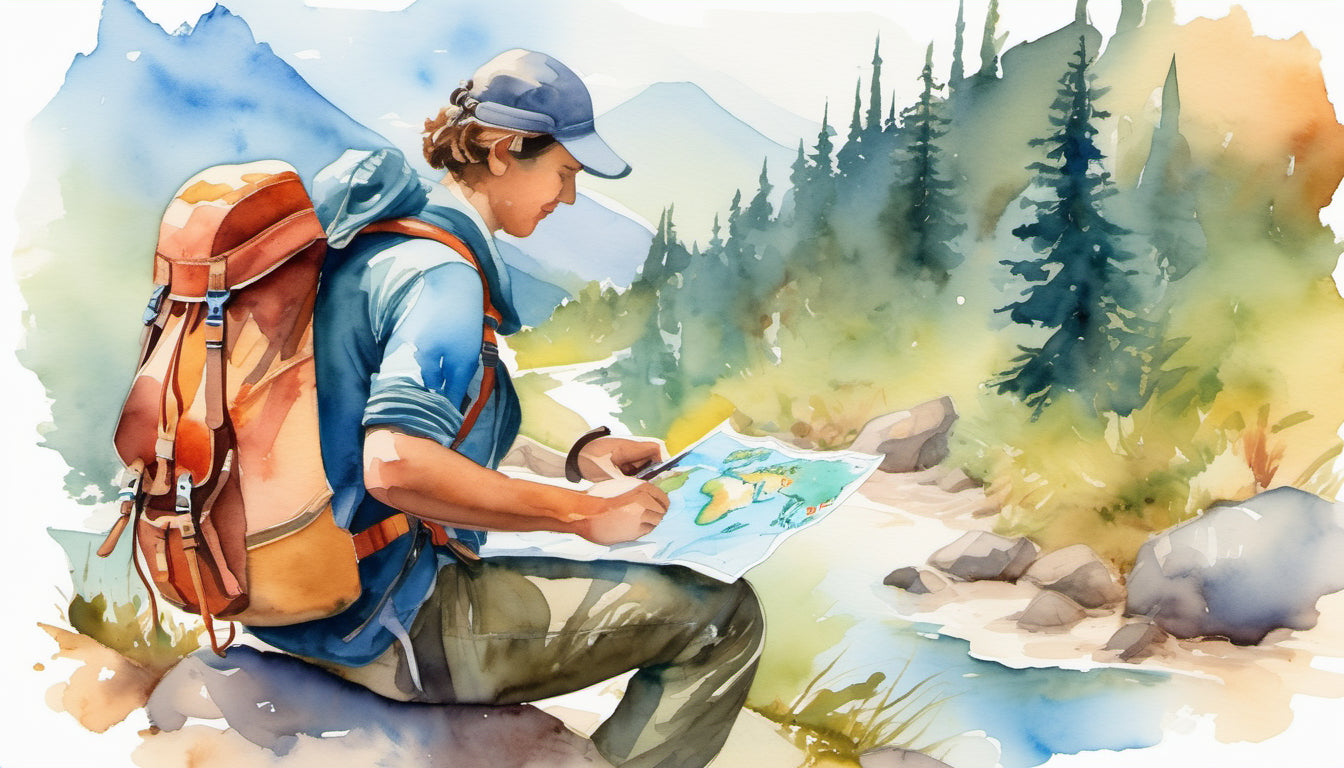Welcome to the great outdoors! There's nothing quite like immersing yourself in nature and exploring the beauty of the world around us. Whether you're embarking on a hiking trip, camping adventure, or any other outdoor excursion, it's important to prioritize your safety and the protection of your belongings.
When venturing into the wilderness, it's crucial to be prepared and equipped with the right gear to keep both yourself and your belongings safe. In this article, we will explore some essential outdoor safety tips to help you protect your belongings and ensure a successful and enjoyable adventure.
So, let's dive in and discover how you can safeguard your belongings in outdoor settings and make the most out of your outdoor experiences!
Choosing the Right Backpack
When it comes to outdoor adventures, a reliable backpack is an essential piece of equipment. Whether you're backpacking, hiking, or camping, having the right backpack can make all the difference in your comfort and safety. Here are some factors to consider when choosing the perfect backpack:
Consider Durability and Waterproofing
You want a backpack that can withstand the elements and last through rugged conditions. Look for backpacks made from durable materials such as nylon or Cordura. These materials are resistant to tears and abrasions, ensuring that your backpack can handle rough terrains. Additionally, consider choosing a backpack with waterproof or water-resistant features. This will help protect your belongings from rain and other moisture.
Optimal Size and Weight
Finding the right size and weight for your backpack is crucial. A backpack that is too big can be cumbersome and uncomfortable to carry, while a backpack that is too small may not have enough space to fit all your essentials. Assess your needs and consider how long your outdoor adventure will be. A backpack with a capacity of 30-50 liters is typically suitable for day trips, while a larger backpack (50+ liters) may be necessary for multi-day excursions.
Security Features
Keeping your belongings secure is important, especially when you're out in the wilderness. Look for backpacks that have security features such as lockable zippers or built-in locks. These features can help deter theft and give you peace of mind knowing that your belongings are safe. Additionally, consider backpacks with hidden pockets or compartments where you can store valuable items discreetly.
Remember, your backpack is going to be your trusty companion throughout your outdoor adventure. Take the time to find the right backpack that suits your needs and provides you with comfort, durability, and security.
"A good backpack is one that feels like a part of you, not an accessory that you carry on your back." - Unknown
Essential Gear for Outdoor Safety
When heading out on an outdoor adventure, it's important to be prepared and have the right gear to ensure your safety. Whether you're going hiking, camping, or backpacking, having essential gear will help you navigate, stay hydrated, and handle emergency situations. Here are some must-have items to consider packing for your outdoor excursions:
Navigation Tools (Map, Compass, GPS)
- Map: Always carry a detailed map of the area you'll be exploring. It's essential for orientation and navigation. Make sure the map is waterproof or keep it in a waterproof case.
- Compass: A compass is a reliable tool for determining direction and helping you find your way in case you get lost. Take the time to learn how to use it properly before your trip.
- GPS: A GPS device or smartphone with GPS capabilities can provide accurate location information when paired with the appropriate apps or software. It can be helpful for tracking your route and marking important waypoints.
First Aid Kit
A well-stocked first aid kit is crucial for any outdoor adventure. It should include essentials like bandages, adhesive tape, antiseptic wipes, pain relievers, insect repellant, and any necessary personal medication. Familiarize yourself with the contents of the kit and know how to use them.
Illumination (Headlamp, Flashlight)
- Headlamp: A hands-free headlamp is a convenient lighting option when camping or hiking in low-light conditions. Ensure it has adjustable brightness settings and a long battery life.
- Flashlight: A reliable flashlight can help you navigate in the dark or signal for help. Consider a compact and waterproof option with multiple brightness settings.
Multi-Tool
A multi-tool is a versatile and compact tool that combines various functionalities like pliers, screwdrivers, knives, and more. It can be handy for repairs, opening cans, or performing other tasks.
Emergency Shelter (Tent, Tarp)
- Tent: A sturdy and waterproof tent provides shelter from the elements and gives you a safe place to sleep. Choose a tent that suits the conditions you'll encounter, whether it's cold, rainy, or windy.
- Tarp: A lightweight and waterproof tarp can serve as an extra layer of protection against rain, wind, or sun. It can also be used to create makeshift shelters or ground cover.
Food and Water Supplies
A sufficient supply of food and water is essential. Pack lightweight, non-perishable food items that are easy to prepare. Carry enough water for your trip or bring a water filtration system to purify water from natural sources.
Safety Whistle
A loud safety whistle can be a lifesaver in case of an emergency. It can help rescuers locate you more easily, even from a distance. Make sure it's made of durable materials and attach it to your backpack or clothing for quick access.
Protection from Weather Elements
Weather-appropriate clothing is essential for outdoor safety. Dress in layers to adapt to changing weather conditions. Pack items like rain jackets, hats, gloves, and thermal base layers to stay warm and dry.
Sun protection is crucial, especially in sunny or high-altitude environments. Bring sunscreen, sunglasses, and a wide-brimmed hat to protect yourself from harmful UV rays.
By including these essential gear items in your outdoor adventure kit, you can better ensure your safety and enjoy your time in nature. Remember to always prepare for the specific conditions you'll encounter and stay informed about the area you'll be exploring.
Securing Valuables in Outdoor Settings
When heading out on an outdoor adventure, it's important to bring along your valuable belongings like phones, wallets, and cameras. However, keeping these items safe and secure can be a challenge in an outdoor setting. To help protect your valuables, here are some tips to keep in mind:
Use of Waterproof Containers
One of the easiest ways to protect your valuables from water damage is by using waterproof containers. These containers provide a barrier against moisture, ensuring that your electronics and other sensitive items stay dry. Look for containers that are specifically designed to be waterproof and offer a secure seal.
Locks and Padlocks
Adding locks and padlocks to your bags is another effective way to keep your valuables safe. Choose locks that are sturdy and difficult to break. This will deter potential thieves and provide an extra layer of security. Remember to lock your bags whenever you're not actively using them.
Distributing Valuables in Different Bags
Instead of keeping all your valuables in one bag, distribute them among multiple bags. For example, you can keep your wallet and phone in your backpack, while your camera can be in a separate camera bag. By spreading out your valuables, you minimize the risk of losing everything if one bag gets stolen or misplaced.
Utilize Hidden Pockets and Compartments
Many backpacks and travel gear come with hidden pockets and compartments designed for safe storage of valuables. Utilize these hidden spaces to keep your items out of sight and less likely to be targeted by thieves.
Keeping Valuables with You
For items that are small and essential, like your wallet or phone, it's best to keep them with you at all times. Use a secure and easily accessible pocket to hold these items. This way, you have direct control over them and reduce the risk of losing them.
Remember, security is important, but it shouldn't hinder your outdoor experience. Use these tips in combination with other safety measures to ensure that your belongings are well-protected while enjoying your adventure.
Campsite Safety Measures
When you're out on an outdoor adventure and have found the perfect place to set up camp, it's important to prioritize your safety. Follow these campsite safety measures to ensure a secure and enjoyable experience:
Choosing a Safe Campsite
- Look for a level and dry area to set up camp.
- Avoid camping under dead or leaning trees, as they can potentially fall.
- Check for existing fire pits and choose a designated campsite to minimize the risk of spreading fires.
- Stay away from areas prone to flash floods and avalanches.
Fire Safety Precautions
- Clear a perimeter around your campfire. Remove any flammable material such as leaves, twigs, and dry grass.
- Keep a bucket of water or a fire extinguisher nearby in case of emergencies.
- Never leave a campfire unattended and ensure it's completely extinguished before leaving the campsite or going to bed.
Proper Food Storage
- Store your food securely to avoid attracting wildlife. Consider using bear canisters or hanging your food from a tree branch.
- Keep your cooking area separate from your sleeping area to prevent food odors from attracting animals.
Wildlife Awareness
- Be aware of the local wildlife, including any potential dangers posed by bears, snakes, or insects. Research the area beforehand to familiarize yourself with any specific wildlife risks.
- Keep all food, trash, and scented items stored properly to minimize the risk of attracting animals to your campsite.
Leave No Trace Principles
- Follow the principles of Leave No Trace to minimize your impact on the environment and maintain the integrity of the campsite. These principles include packing out all trash, minimizing campfire impacts, and respecting wildlife and vegetation.
Remember, these campsite safety measures are essential for protecting yourself, other campers, and the environment. By taking precautions and being mindful of your surroundings, you can have a safe and memorable camping experience.
Personal Safety Tips
When it comes to outdoor adventures, ensuring your personal safety should be a top priority. Whether you're hiking, camping, or exploring new trails, these personal safety tips will help you stay protected and enjoy your adventure to the fullest.
Informing Others About Your Adventure
Before you embark on your outdoor adventure, it's crucial to inform someone trusted about your plans. Share details like the location you'll be visiting, the duration of your trip, and your expected time of return. By doing so, someone will be aware of your whereabouts and can alert authorities if you don't return as planned.
Carrying Means of Communication
Having a means of communication with you is essential in case of emergencies. Consider carrying a fully charged cell phone, a whistle, or a personal locator beacon (PLB). These devices can help you reach out for help if you find yourself in a dangerous situation or get lost.
Being Aware of Surroundings
When exploring the outdoors, it's crucial to stay alert and be aware of your surroundings. Keep an eye out for any potential hazards, such as steep drops or loose rocks. Be cautious of wildlife and know how to respond appropriately if you encounter any.
Knowing Basic Self-Defense
While no one wants to encounter a dangerous situation, it's essential to be prepared for the unexpected. Take the time to learn some basic self-defense techniques, such as how to escape from a grab or defend yourself from an attacker. These skills can give you confidence and increase your safety while outdoors.
Dress Appropriately
Choose clothing that suits the weather and activity you'll be engaging in. Dress in layers so you can adjust your clothing as needed. Wear sturdy and comfortable footwear that provides good traction and support. Don't forget to protect yourself from the sun by wearing a hat, sunglasses, and sunscreen.
Weather Monitoring
Monitor weather conditions before and during your outdoor adventure. Stay informed about any weather alerts or warnings in the area you'll be visiting. If the weather conditions become unsafe, be prepared to change your plans or seek shelter until it improves.
Remember, personal safety should always be a priority when venturing into the great outdoors. By following these personal safety tips, you'll be better prepared to handle any challenges that may arise and ensure a safe and enjoyable adventure for yourself and your companions.
Emergency Preparedness
When it comes to outdoor adventures, being prepared for emergencies is crucial. While we hope for the best, it's important to plan for the unexpected. By taking a few precautions and being prepared, you can ensure your safety and the safety of others during your outdoor excursions. In this section, we will explore some essential tips for emergency preparedness.
Knowing Emergency Contacts
- Save important numbers: Before heading out on your adventure, make sure to save emergency contact numbers in your phone. This includes local emergency services, park ranger stations, and the contact information of someone who can notify authorities in case of an emergency.
- Share your itinerary: Inform a trusted friend or family member about your adventure plans, including your estimated return time, route, and any possible alternative plans. This way, if you encounter any issues, they can take appropriate action on your behalf.
Learning Basic First Aid
- Take a first aid course: Knowing how to administer basic first aid can be incredibly valuable in emergency situations. Consider taking a first aid course before embarking on your outdoor adventures. This will give you the knowledge and skills to handle common injuries and medical emergencies.
- Carry a first aid kit: Always have a well-stocked first aid kit with you. Include items such as bandages, antiseptic ointment, pain relievers, insect repellent, and any necessary prescription medications.
Carrying Emergency Blankets
- Be prepared for unexpected weather: Weather conditions can change rapidly during outdoor adventures. Make sure to pack emergency blankets, which are lightweight and compact. These blankets can provide insulation and protect you from hypothermia in case of cold weather or unexpected overnight stays.
Knowing the Route and Area
- Familiarize yourself with the area: Before heading out, study maps and guides of the area you will be visiting. Understand the potential risks, such as steep terrain, rivers, or local wildlife. This knowledge will help you make informed decisions and navigate safely.
- Stick to marked trails: While exploring off the beaten path can be tempting, it's important to stick to marked trails, especially if you are not familiar with the area. This will minimize the risk of getting lost or encountering dangerous situations.
Signal for Help
- Carry signaling devices: In case of an emergency, having a way to signal for help is crucial. Consider carrying a whistle, signal mirror, or even a flare. These devices can attract attention from search and rescue teams, increasing your chances of being located quickly.
By following these tips for emergency preparedness, you can ensure your outdoor adventures are enjoyable and safe. Remember, proper planning, knowledge, and the right equipment can make all the difference in emergency situations. Stay prepared and stay safe!
Conclusion
Conclusion
In conclusion, outdoor adventures can be exhilarating and fulfilling, but it's essential to prioritize your safety and the security of your belongings. By following the tips and guidelines mentioned in this article, you can ensure a safer and more enjoyable experience while exploring the great outdoors. Remember to choose the right backpack, pack essential safety gear, secure your valuables, practice campsite safety measures, prioritize personal safety, and be prepared for emergencies.
At Empowered by Ashley, we understand the importance of personal safety and provide products designed to empower individuals in various situations. Our best-selling Personal Safety Alarm is a compact and discreet device that emits a loud sound to deter attackers and alert others to your situation. It's an effective tool that can provide you with a sense of security and peace of mind during your outdoor adventures.
To learn more about our Personal Safety Alarm and other empowering products, visit our website here. Stay safe and empowered on your next outdoor adventure!
Frequently Asked Questions
-
What are some essential outdoor safety tips for adventures?
Some essential outdoor safety tips for adventures include: 1. Plan and prepare in advance, 2. Check weather conditions, 3. Carry essential equipment and supplies, 4. Stay hydrated and nourished, and 5. Let someone know about your itinerary.
-
Why is it important to check weather conditions before going on an outdoor adventure?
Checking weather conditions is important to ensure you are prepared for any potential hazards like storms or extreme temperatures. It helps you make informed decisions about what gear to bring and whether it's safe to proceed with your adventure.
-
What kind of essential equipment should I carry for outdoor adventures?
Essential equipment for outdoor adventures may include a map and compass, appropriate clothing and footwear, a first aid kit, a headlamp or flashlight, a multi-tool or knife, and communication devices like a cellphone or radio.
-
How can I stay hydrated and nourished during outdoor adventures?
To stay hydrated, carry an adequate amount of water and drink regularly. Pack lightweight, high-energy snacks like trail mix, energy bars, or fruits to maintain nourishment during your adventure.
-
Why is it important to let someone know about your itinerary before going on an outdoor adventure?
Informing someone about your itinerary is crucial for safety in case of emergencies. Share details like your planned route, expected return time, and any alternate plans. This way, someone can raise an alarm and send help if you don't return as scheduled.
















Leave a comment
This site is protected by hCaptcha and the hCaptcha Privacy Policy and Terms of Service apply.